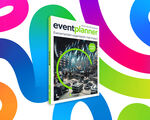Did you wake up this morning feeling anxious about your first meeting with your event clients? Do you wish you could postpone it, although you know you can't? Are you worried about how it will go and how your clients will perceive you?
Don't worry - we have all been there. If one lacks practice or hundreds of meetings under his or her belt, the low self-confidence is understandable. Yet, you can overcome this feeling by knowing how to structure the meeting dialogue and deal with the information you'll receive.
You see, the first meeting with a client is crucial. First of all, you create a first impression about yourself. Secondly, you establish a communication dynamic that will continue during the entire planning period. And thirdly, you’ll have to take lots of notes. The way you take notes will influence greatly the meeting. Why?
- If you know what to ask and what details to concretize, you'll show your level of preparation.
- By capturing all of the detail on paper, you’ll be able to work afterwards without bothering the client with the same questions.
- By clarifying all doubts up front, you’ll avoid further misunderstandings.
Being thoroughly prepared will impress your clients and demonstrate how reliable and professional you are. Let me show you what I'm talking about.
Things planners should do if they want to have successful first meetings with their clients
- Prepare an event info template
Before the meeting, prepare an agenda with all the topics you want to discuss. You can use a simple Word document and leave blank spaces for you to write. Structure the information in big categories, such as general information, pre-event, event, and post-event.
For example, in the 'pre-event' category, you can indicate sub-categories such as venue, catering, invitations, CRM lists, registration process, social media, etc.
In the 'event' category, you can indicate sub-categories such as volunteers, venue accommodation, engaging activities, networking, etc.
And in the 'post-event' category, you can indicate sub-categories such as Thank you emails, content publication, video publication, post-event communication, etc.
Of course, the list is customizable and you can create one template for all future meetings. This way, you'll be sure that you have one document per event and you introduced all the required data. Also, this will show your clients how well prepared you are. This will make them feel more relaxed, knowing that you lead the conversation and guide them into revealing the necessary information.
- Structure the tasks effectively as you take notes
There are event managers that prefer to type the information, yet it’s recommended to write by hand.
Research shows that writing by hand enhances your memory and also has a different impact on how you process the data. People are more aware when they write by hand. Later, you can transfer the meeting information to a Word document, but if you can, write everything by hand first (using abbreviations to make the process quicker and ensure you capture everything).
That being said, apart from the event info template, you’ll also need a notebook.
A spiral notebook is preferable, because it's easier to turn the pages and to write in it. Know how to organize the tasks adequately.
Create one quadrant for urgent things to do and another one for important things to do. Also, write in the tasks that don't fall in the previously mentioned quadrants, yet have to be accomplished before, during, or post-event.
Make sure you indicate the deadlines and the responsibilities for each tasks. Also, establish the next meeting date. Don't leave that first meeting without deciding what the next steps are and who is doing what.
- Clarify all the doubts
Before finishing the meeting, review your notes and see if there are any doubts left. Double-check everything, even the things you see as obvious. When planning an event, it’s very easy to discard the doubts and think that it's dumb to ask a question because it’s obvious. No, it's not. This happens because each person involved in the planning has his or her own answer. Only by asking a question and discussing a subject can you understand how misleading this 'obvious' belief is. Clarify everything. It will make your event easier to plan.
Call to action
In a few hours or in a few days, you have a first meeting with your clients. You have enough time to prepare yourself. Open a new document and type all the pre-, during-, and post- components that create an event. Then, formulate some questions around each concept. Use the 'why', 'what', 'when', 'how' and 'who' principle. Create a table and introduce these concepts with the questions. Leave some blank spaces for you to write answers and any additional information. Print the document, take your notebook, and you are ready for the meeting! Good luck!







